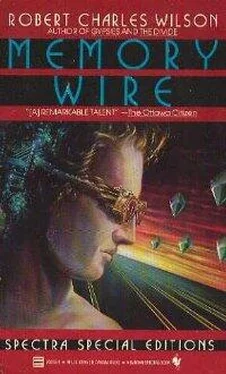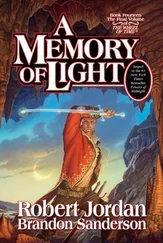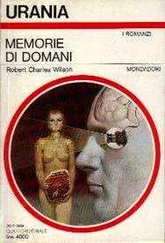Robert Wilson - Memory Wire
Здесь есть возможность читать онлайн «Robert Wilson - Memory Wire» весь текст электронной книги совершенно бесплатно (целиком полную версию без сокращений). В некоторых случаях можно слушать аудио, скачать через торрент в формате fb2 и присутствует краткое содержание. Год выпуска: 1987, ISBN: 1987, Издательство: Bantam Spectra, Жанр: Фантастика и фэнтези, на английском языке. Описание произведения, (предисловие) а так же отзывы посетителей доступны на портале библиотеки ЛибКат.
- Название:Memory Wire
- Автор:
- Издательство:Bantam Spectra
- Жанр:
- Год:1987
- ISBN:978-0-553-26853-9
- Рейтинг книги:4 / 5. Голосов: 1
-
Избранное:Добавить в избранное
- Отзывы:
-
Ваша оценка:
- 80
- 1
- 2
- 3
- 4
- 5
Memory Wire: краткое содержание, описание и аннотация
Предлагаем к чтению аннотацию, описание, краткое содержание или предисловие (зависит от того, что написал сам автор книги «Memory Wire»). Если вы не нашли необходимую информацию о книге — напишите в комментариях, мы постараемся отыскать её.
Memory Wire — читать онлайн бесплатно полную книгу (весь текст) целиком
Ниже представлен текст книги, разбитый по страницам. Система сохранения места последней прочитанной страницы, позволяет с удобством читать онлайн бесплатно книгу «Memory Wire», без необходимости каждый раз заново искать на чём Вы остановились. Поставьте закладку, и сможете в любой момент перейти на страницу, на которой закончили чтение.
Интервал:
Закладка:
Everybody said so. Meg said so. Their CO said the posseiros were hanging fire against the possibility of a dry-season offensive in the populated west. Covert sensors along guerilla supply trails had registered diminished activity for more than a month. Keller’s platoon had walked patrol into five government-held strategic villages in this ravaged farm country, and the only sign of enemy action had been a single undetonated flail trap loaded with monomolecular wire: the trigger had rusted open. They disarmed it and marched on.
Keller felt the obvious sense of relief, but also, curiously, a muted disappointment. Not that he was anxious to see combat. He wasn’t naive and he wasn’t stupid. He had seen the wounded ferried in to the base hospital at Cuiaba ; he understood about pain and death. Nor was he, in the cute Psych Corps phrase, “hypermotivated”—he was here strictly because his lottery number had come up.
But he could not help thinking of what Megan had told him that night in his bunk. “Out there, Ray, it’s easy-to do things you’re not proud of.”
It was more than anyone else had said to him. “Out there,” she had said. Like it was the name of a place. Out there. A mystery. No one talked about it, but it was at the center of all their lives. They were trained for it, they dreamed about it; Keller was reminded a dozen times daily that he was, by this final criterion, a virgin. And so he asked himself all the dumb and obvious and impermissible questions. Will I be brave? Will it hurt? Will I die?
But the end of the patrol had almost come, and Keller had begun to believe the questions would not be answered this time out. And he was occupied with this curious mixture of gratitude and disappointment when the dread thing actually became real—when the ambush came down around him.
They were crossing a manioc field toward the margin of the contested highway, BR-364. They were in loose formation. A nineteen-year-old named Hooper was walking point. Hooper was weighed down with sensory extenders and a heads-up helmet display that made him look like a cockroach (Byron had said this) on its hind legs. Hooper should have warned them. But Hooper was goofing off. In the glare of the first explosion Keller saw Hooper diddling his arm controls—maybe trying to focus in on some suspicious image but more likely just playing with the display, turning the sky purple or some shit like that. They warned you about that in basic. Don’t play games. It was elementary. Keller’s first reaction to the attack therefore was this burst of petulance toward Hooper. Hooper! he thought. Hooper, you asshole!
The shock wave knocked him down.
The next moments were timeless. By dint of luck he had fallen into a bomb crater as wide as his body. It afforded a little protection against the wire barrage flailing out from tree cover. Keller rolled on his belly in time to see Logan, a black Spec/4, take a wire. Keller was shocked into dis-passion. It was as if Logan had walked into a hail of razor blades. He was blood all over, toppling like a tree. He was too cut up to make any noise. He just fell.
My Christ, Keller thought.
His rifle was compressed in the mud beneath him. He drew it out now, trying not to panic, wanting the protection of it, but there was nothing obvious to shoot at: only the stand of distant trees, the empty ribbon of highway, the still air edging toward dusk. In this momentary lull Keller was able to hear the CO shouting incoherent orders somewhere off to the left, this escalating into a scream. He belly-crawled forward until he was able to scan a section of the field. Everybody down, whole or cut. Hooper down. The CO down and bleeding. Yards away, in the meager cover of a stump, the radioman made a staccato call for aid and air cover. With a dizzying combination of reluctance and urgency, Keller forced himself to look for Meg.
His eyes lingered a second on Byron Ostler, the platoon Angel, who was down and whole and scanning the scene methodically. Watching, Keller felt a microsecond of envy. He was deep in it, Keller thought: lost in some neurological subroutine, miles beyond fear. Angel Zen. The thinking part of him had closed up like a nut. It must be sweet.
All this in an eyeblink.
And then he found Meg. She had been walking to his left and a couple of yards to his rear. He had to crane his head to find her. When he did, he wished he hadn’t.
She had been hit.
The horror of it was giddy, skull-cracking. Keller blanked on it—was not sure for a second what he was looking at.
She had taken a wire in the legs, and her legs below the knees were a hideous red confetti. She couldn’t walk. She couldn’t stand. She was exposed, out there on the furrowed blankness of the manioc field. And she was alive.
She was gesturing to him. Her hand was out. Ray, she seemed to be saying. She wanted him to pull her into the crater with him, somewhere where she might be safe— might live until a medevac unit arrived. He blinked, watching. She stretched her bloody hand toward him, and the look in her eyes now was fervent, terrifying. He scuffled forward and reached for her. When someone hurts, he thought, you help. It was as simple as that.
But then a second barrage began, the eerie high keening of the wire weapons followed seconds later by the concussion of cluster bombs, and Keller froze. The terror that overtook him was a new thing. He imagined it was a mirror of the fear in Meg’s own eyes. He heard screams above the din of the barrage and knew immediately that this was how his own screams would sound, imagined the terror liberated from his throat in one of those long animal howlings, the last constraints of sanity unbuckled in the onrush of pain and death. He felt the burr of shrapnel in the air above him, and pulled back his hand.
I’ll die, he thought. There was a cool and relentless logic in it. If I lift myself up there and grab hold of her, I’ll die. All of this was calculable: impact, detonation, velocity, speed, weight; God, he guessed, was a kind of mathematician, handing down these neat calculations.
It might have been only a moment’s doubt. Later he would tell himself he had meant to help her, that he was only shocked by the concussions, trapped in a second’s indecision…
But she died while he hesitated. A wire barrage found her, the monofilaments flaying into her midriff. The impact took her, and she moved in the familiar ballistic, lifted and carried back. He saw her dogtags whirl in an arc through the boiling air, severed from their chain. She tumbled into the high weeds limply.
The motion was simple but profound. It meant, Keller thought, that she had entered into the mathematics of inanimate things.
He understood about death. People die all the time. People die especially in combat: it’s the nature of the thing. It’s bad, he thought, but it happens.
But he had loved her.
But the people you love die too. The comprehension of death had come early to him. He had seen his mother stretched out in a mortuary box when he was only seven years old, and understood that—although she appeared to be lost in some especially deep and troubled sleep—the fact was that she would not wake up. The breath would not sigh in and out again, the eyes would not blink open ever. That was death, substantial, right in front of him.
When his father died some years later, Keller was old enough to take a job, keep up the apartment over the bodywork shop. He preserved everything meticulously in its place. Hanging onto the illusion of normalcy. It was another way of hiding the eyes, subverting this juggernaut of grief; it was a habit, and he had acquired it early.
And so after Meg’s death and his own mute complicity in it, he came to understand Byron, the Angel, the Eye. “You saw,” Keller accused him in a drunken moment days later.
Читать дальшеИнтервал:
Закладка:
Похожие книги на «Memory Wire»
Представляем Вашему вниманию похожие книги на «Memory Wire» списком для выбора. Мы отобрали схожую по названию и смыслу литературу в надежде предоставить читателям больше вариантов отыскать новые, интересные, ещё непрочитанные произведения.
Обсуждение, отзывы о книге «Memory Wire» и просто собственные мнения читателей. Оставьте ваши комментарии, напишите, что Вы думаете о произведении, его смысле или главных героях. Укажите что конкретно понравилось, а что нет, и почему Вы так считаете.












